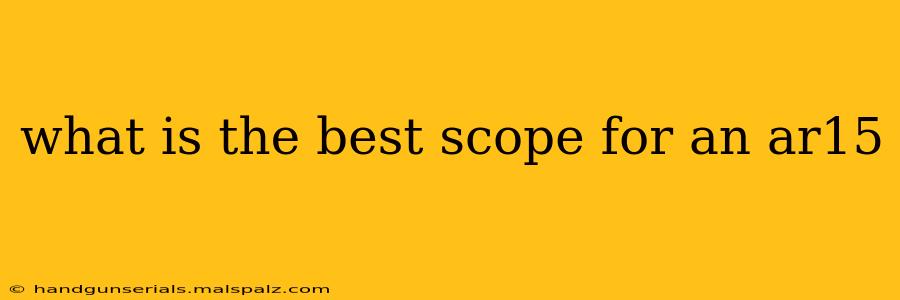What's the Best Scope for an AR-15? Finding the Perfect Optic for Your Needs
Choosing the best scope for your AR-15 depends entirely on your intended use. There's no single "best" scope; the ideal optic will vary dramatically depending on whether you're a long-range precision shooter, a home defender, or a competitive shooter. This guide will break down the key factors to consider, helping you find the perfect scope for your AR-15.
Understanding Your Needs: The Foundation of Scope Selection
Before diving into specific scopes, honestly assess how you'll use your AR-15. This will dramatically narrow down your options. Consider these factors:
-
Shooting Distance: Are you planning on shooting at targets within 100 yards, or are you looking for long-range accuracy exceeding 600 yards? This dramatically affects magnification needs. Close-quarters applications rarely require high magnification.
-
Intended Use: Home defense requires a different scope than competitive shooting or hunting. Home defense might prioritize low-light capabilities and a quick target acquisition system like a red dot sight. Long-range precision shooting necessitates higher magnification and precision adjustments.
-
Budget: AR-15 scopes range from under $100 to well over $1000. Determine your budget before you start shopping to avoid buyer's remorse.
-
Mounting System: Ensure the scope you choose is compatible with your AR-15's mounting system, usually a Picatinny rail.
Types of AR-15 Scopes and Their Applications
Let's explore some common scope types and their best uses:
1. Red Dot Sights:
- Ideal for: Close to medium-range engagements (under 300 yards), home defense, and fast target acquisition. Excellent for dynamic shooting scenarios.
- Pros: Lightweight, compact, fast target acquisition, intuitive use, suitable for low light conditions (with illuminated reticles).
- Cons: Limited magnification, not ideal for long-range accuracy.
2. Low-Power Variable Optics (LPVOs):
- Ideal for: Versatile use, encompassing close to medium-range engagements and offering some magnification for longer shots (up to 500 yards). A popular all-around choice.
- Pros: Balance between magnification range and speed, good for various shooting situations, generally robust and durable.
- Cons: Can be heavier and more expensive than red dot sights.
3. Fixed-Power Scopes:
- Ideal for: Specific shooting disciplines or ranges. For example, a 4x fixed-power scope might be ideal for 3-gun competitions.
- Pros: Often simpler, more robust, and more affordable than variable scopes; provide a clear, crisp image at a specific magnification.
- Cons: Lack of versatility; not suitable for varying shooting distances.
4. High-Power Variable Optics:
- Ideal for: Long-range precision shooting (beyond 600 yards). Requires practice and skill to use effectively.
- Pros: High magnification for long-range accuracy, often featuring advanced features like illuminated reticles and windage/elevation adjustments.
- Cons: Expensive, heavier, and more complex to use; can be challenging for beginners.
Key Features to Consider
Regardless of the scope type, several key features are important:
- Magnification: The range of magnification (e.g., 1-4x, 3-9x, 6-24x).
- Objective Lens Diameter: Larger objective lenses gather more light, improving low-light performance.
- Reticle: The pattern in the scope's lens; choose one that suits your shooting style and target distances.
- Eye Relief: The distance between your eye and the eyepiece; crucial for comfortable and safe shooting.
- Durability: Choose a scope built to withstand recoil and the elements.
Conclusion: The Best Scope is the One That Fits You
Ultimately, the "best" AR-15 scope is subjective. Carefully consider your shooting needs, budget, and preferences before making a purchase. Research different brands and models, read reviews, and if possible, try out scopes before buying to ensure a comfortable fit and optimal performance. Investing time in research will ensure your AR-15 is equipped with the optic best suited to your shooting goals.

